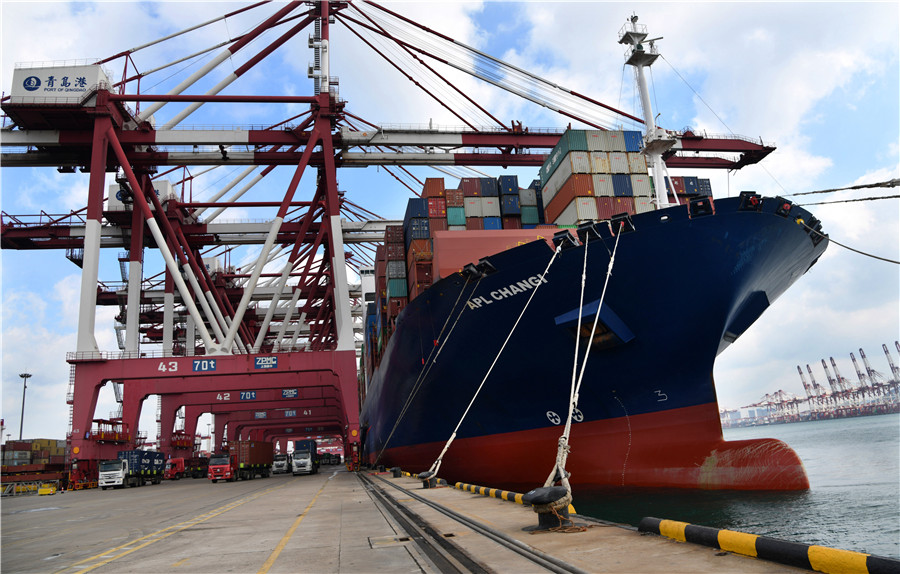China's economic resilience: Beyond Western misconceptions
By Xu Ying | chinadaily.com.cn | Updated: 2023-08-18 14:16

Recent claims by some Western politicians and media outlets alleging that China's economic slowdown could jeopardize global growth deeply misconstrue realities. These distorted narratives warrant reflection. Evidence clearly contradicts descriptions of faltering Chinese growth. Furthermore, propagandized portrayals of looming "China collapse" theories reveal more about internal Western anxieties than actual Chinese economic conditions. Objective examination of China's durable economic foundations and adaptable policies paints a far more resilient picture at odds with superficial "doomsaying".
Statistics solidly refute allegations of major Chinese slowdown. In H1 2022, China's GDP grew 5.5% year-on-year, faster than 2021's full year expansion of 3% and the 4.5% average throughout the 3-year pandemic period. This significantly exceeded US growth by over 3 percentage points. The IMF projected 5.2% Chinese growth in 2022, contributing to one-third of global growth. Claims of dramatic deceleration sit uneasily against such data.
Likewise, closer inspection rebuts notions of faltering fundamentals. China's consumption contributed 110.8% to H1 growth, up 59.4 percentage points annually, with final consumption up 46.4 points to 77.2% of growth. Industrial upgrading continued apace, with 11.5% and 23.1% January-July jumps in high-tech and technology service investment respectively. Despite trade headwinds, exports held a steady market share as new photovoltaic capacity soared over 50% of new total installation. These hardly indicate an economy teetering on the brink.
Of course, post-pandemic recovery was never an assured smooth linear progress. However, China's highly adaptable governance repeatedly demonstrated the capacity to course-correct through pragmatic problem-solving adjustments, not rigid dogmatism. Recent welcomed policies boosted consumption, entrepreneurs and foreign investment manifest. Perfection cannot reasonably be demanded amidst global volatility. But data shows China's economy displaying resilience within an erratic world.
Especially dubious are recurring Western ruin scenarios of a "hard landing" or "Lehman moment" toppling China. Such alarmism reveals less about China than deep-seated Western anxieties. Some perceive any relative loss of US primacy as a civilizational defeat, blinding them to multipolar realities. China's rise disrupts their internalized hierarchies, provoking primal fears of upended status. Therefore, they spout emotively distorted narratives transcending mere economics or geopolitics.
This phenomenon is nothing new. Rising powers inevitably encounter resistance from incumbent leaders. America's earlier ascendance similarly spooked British empire defenders. Now, Sino-US competition leads some to promote improbable collapse theories more reflecting cultural angst than economics. Their rigid tunnel vision misses China's adaptive capacities.
Functionalist analysis demonstrates modern China's resilience better than ideological tropes. Its developmental model has already sailed through multiple global crises. Pragmatic policy adjustments continuously adapt to shifting winds. And its domestic scale provides a buffering capacity. Structurally, China's current position seems far from perilous. Of course economies move in cycles and future slowdowns are inevitable, but obituaries remain premature.
In truth, the West's China narratives reveal more internal fracture than external threats. The real "China crisis" lies in Western loss of confidence and direction. Coping with relative declines and populist divisions at home understandably seems easier when projected outwards through exaggerated fears of rising challengers abroad. But indulging such distortion risks becoming counterproductive self-sabotage.
Obsessively attacking everything Chinese out of displaced inner turmoil leads to nowhere productive. Progress depends on the West rediscovering systemic self-confidence and purpose. Trying to thwart China addresses symptoms rather than causes. Fixating on unlikely ruination scenarios only highlights one's own weakness. As the old proverb says:"When the wind changes direction, there are those who build walls, and there are those who build windmills."
The author was counselor at the Chinese embassy in Switzerland. The views don't necessarily reflect those of China Daily.
If you have a specific expertise, or would like to share your thought about our stories, then send us your writings at opinion@chinadaily.com.cn, and comment@chinadaily.com.cn.
























